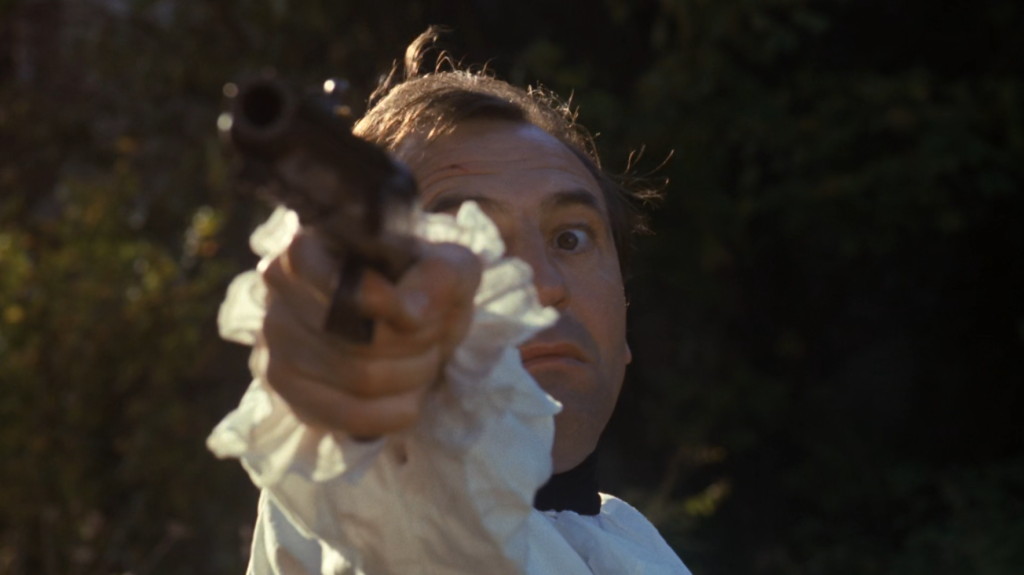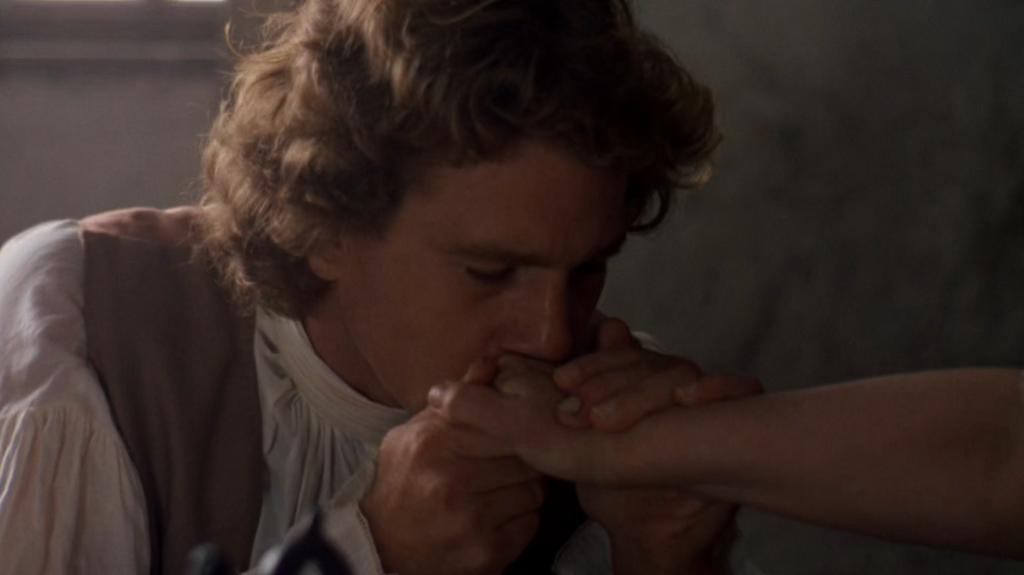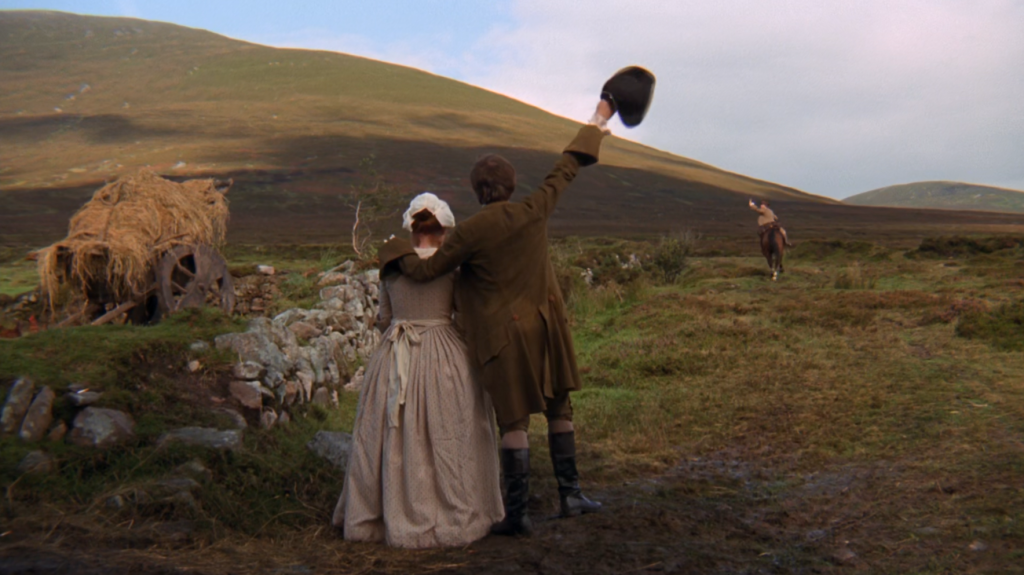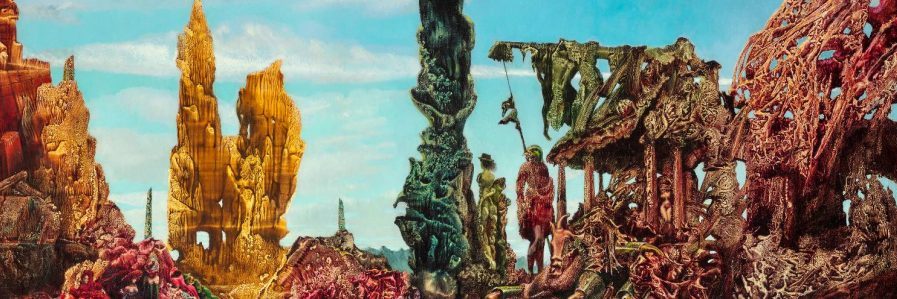It is selection games and debt, all the way down. Nora has been “flinging” herself as an option to “every man” in the area, but none have selected her. Barry owes his uncle a great deal, and his uncle owes the bank a great deal in turn, which puts both into obligation. This debt is part of what compels the uncle to choose to support Nora’s selection—just as, Grogan hopes, Barry’s debt will compel Barry to select differently, to rescind his challenge, to support instead of sabotage the pairing. Debt narrows our agency, lessens our intrinsic empowerment; it is a shackle on our freedom to choose.
The film is adapted from a novel, The Luck of Barry Lyndon, but we know that it is not merely chance which has led to his fortunes—it is also his choices, his skills, and his self. The role of luck is certainly interesting to speculate over—but how much can we learn from it? That selections, skills, status, and luck jointly contribute to gamic outcomes underlies the fact that selection is the only area over which we have control, being the realm of conscious choice. Our status may be partially the result of historical choice (in addition to birthright), a mix that similarly characterizes skill—we must choose, each day, to hone our abilities. But when we enter a game, with all our abilities and identities pre-determined, and luck impartial to our aims, what we are left with is choice.
And, crucially, we do not choose without reasons—even when we are “irrational.”
One cannot do sociology without accepting what classical philosophers called the ‘principle of sufficient reason’ and without assuming, among other things, that social agents don’t just do anything, that they are not foolish, that they do not act without reason… This reason permits [the sociologist] to explain and to transform a series of apparently incoherent, arbitrary behaviors into a coherent series, into something that can be understood according to a unique principle or coherent set of principles.
Bourdieu, “Is A Disinterested Act Possible?
Lest you, the reader, object that humans cannot be distilled into a coherent set of reasons or behaviors, note that this is how everyday social modeling already works. If you have a folk concept of intent which you employ to understand social situations, if you recognize behavioral patterns in others which relate to their goals, then you have ceded the sociologist’s theoretical ability to perform his similar reductions.
Here’s how this works: we’ll ask why Barry does what he does, and by asking, we’ll figure out who Barry is.


If speech is an action, an attempt to change the world through symbols—which only have efficacy through people, that is, which use people as a medium to effect transformations—then what is Barry after? I think, pretty simply, that he wants his desires to be taken seriously. His challenge, to Captain Quin, does not automatically result in a duel. Rather, the duel requires Quin taking it seriously, requires some degree of buy-in from other members of his immediate social circles, who will facilitate the duel—chiefly, buy-in from family members, from Grogan, from Quin himself. And that requires their taking Barry’s challenge—the passions of an adolescent—seriously. Not as fleeting whim, but as intractable resolution. He will not be persuaded, so they ought not even try; instead, they ought to move forward as quickly as possible with the duel, to reach a resolution.


Note that not just are Grogan, and Barry’s family, not incentivized to facilitate this duel—they are actively incentivized to refuse facilitating it. Either likely outcome is intolerable: either Barry’s mother, already widowed by a duel, will now see her only son killed over folly. Or Quin, whose marriage to Nora will bring the family life-changing income, will be killed, or injured or disgraced to the point of calling off the marriage. Thus the family—and Grogan, perhaps the wisest character in Barry Lyndon—must actively strategize to prevent these outcomes. The first strategy involved dissuading Barry, in playing down his seriousness, in guilting him through a reminder of his debts to his uncle. When this fails, they will have to fall back to a different strategy. It is important to note that this first strategy is likely not planned, conspiratorially, by the family. Rather, it is being spontaneously employed by players with loosely aligned interests, who understand these shared interests, and who stigmergically coordinate in intervening against Barry’s duel. Only when necessary coordination becomes especially intricate to players fall back on premeditation and choreography.

Grogan offers to stand in as Barry’s second, which will play a key role in this second, more intricate strategy, which involves packing Barry’s pistol with pellet, rather than proper lead. And yet it is important to disentangle the banal strategic dispositions of human life from Machiavellian maneuvering: Grogan likely did not have this specific outcome in mind when he made the offer to stand as Barry’s second. Barry’s challenge was fresh; Grogan likely had not had time to consult with Barry’s uncle and cousins, to formulate their eventual plan. But Grogan recognizes that, by being close to the action, and involved in the duel, he will be more empowered to act, intervene, and nudge events toward desirable outcomes. This is what we might call “intrinsic empowerment” or “keeping upwind”: Grogan is vaguely empowering himself, making choices which will, broadly, increase his agency over events and outcomes in a coming game. By consistently angling himself into positions of agency, in those games and situations which are of import to him, he puts himself in a place to have greater flexibility and ability to intervene when the time comes. Similarly, in social interactions, we often do not so much stare down the long garden of forking paths, modeling what will happen twelve steps out, but have a general sense of which directions the conversation would take that would be more or less dangerous, more or less empowered, etc. There is a vague sense of directional attraction or repulsion which, as we move toward it, and events unfold, and the situation clarifies, puts us in a better position than we might otherwise have been in.
Grogan’s positioning pays off immediately:

We get, now, one of the great shots of cinematic history, the camera slowly pulling out from a close-up on the pistols to a landscape shot, the arena of the game:
Both Quin and Barry look vaguely sick. Grogan takes advantage of the expression on Barry’s face, attempts one last time to persuade him to give up the duel and leave town—offering ten guineas should he wish to stay in Dublin for a few weeks as events blow over. To be out of the family’s hair, until Quin and Nora’s marriage has finalized, and Barry has no recourse to reclaim her.
And yet it is not merely a pragmatic offer. There is a symbolic cost as well: Barry must apologize to Quin, so that the matter can be “considered honorably handled.” Note the doubling of considered and honorably: there is something very interesting here, where the language betrays an attitude that does not quite reify the honorable as a fact of nature, but considers it a subjective assessment, a social reality which is nonetheless imperative to uphold. Barry’s cousin, with the optimism of one who does not, symbolically, have to kneel: “Say you’re sorry, Redmond. You can easily say that.” But Barry will not diminish his own dignity to preserve Captain Quin’s. The affair, in some sense, has moved past Nora as its chief subject. Its real psychological spur is Nora’s rejection of Barry for Quin, and the social humiliation which accompanies her “trading up”:
Nora reminds Barry of the games in which Quin is winning, the ways he is Barry’s superior: “You’re only a boy and penniless.” These competitions of status—Quin’s employment and rank; his being English instead of Irish—are ones in which Barry is disadvantaged. So he seeks instead to win the right to Nora through another game entirely—or, at least, to remind her of his capacity within this alternate gameplay: “If I meet him again, you will find out who is the best man. I’ll fight him, Captain as he is.” But she only reminds him, once again, of their status differential: “It is mighty well of you to fight farmers’ boys, but to fight an Englishman is a different matter.” And it is this inferiority, not of selection or skill but of selfhood, of status, that sets Barry’s heart again Quin and Nora both.
To back down would be to validate, with his own behavior, his own assessment of reality, Nora’s degradation of him. Barry: “I am not sorry, and I will not apologize, and I would as soon go to Dublin as to hell.”
And we get to witness, now, one of Barry’s greatest advantages as a gamesman: it is his nerve. He is half Quin’s age, and yet there is a calm which steadies his hand as he cocks and fires. He is grim, but he is under control.


The bird-faced captain, meanwhile, is a mess; his hand quakes like an alcoholic. No doubt this fear helps inspire Barry’s calm—it is when others are most lost and panicked, that the wind, for some men, dies down, is replaced by quiet. And when, in the final duel of Barry Lyndon, when everything else reverses—when it is now an older, corrupt Barry who is challenged over a woman, challenged by his step-son, whose determination and sense of honor are like the young Barry’s own—it remains Barry who is unperturbable, while the step-son vomits in the corner of the barn, misfires his pistol.


The predictions that are fear and confidence make themselves real: Captain Quin falls, and resigned harpsichord enters on the soundtrack. The cousins and Grogan kneel around Quin; one takes his pulse. “Is he dead?” Barry asks. “Quite dead,” comes the answer. They remove their hats as a symbol of respect; the acting is perfect. “This has been a sad day’s work for our family, Redmond Barry. And you’ve robbed us of 1500 a year. Now you’d better ride off before the police are up. They had wind of this business before we left Kilwangan.”
And they are safe, here, in their deception, because of how norm-shattering it would be for Barry to reject their appraisal, to take Quin’s pulse himself. In the face of tragedy, a zone of sacredness descends. To question the legitimacy of the tragedy is coarse, tone-deaf, incurs social sanction. There can only be respect paid; to question the epistemic or moral basis of the judgment, that the tragedy is tragic, is unconscionable. And because all three of them—Barry’s two cousins plus Grogan—have gone “confederate,” are in on the hoax together, they create a social reality which Barry would not think to question, to begin with.
How different Barry’s fate might have been, had he not fallen in love with Nora, and had he not flung the wine in Quin’s face. But he was destined to be a wanderer, and the battle with Quin set him on his travels at an early age.
Barry’s mother welcomes him, pinching his cheeks, overjoyed that her only child has survived the duel. She does not know this will be the last time she sees him for over a decade.

The cousin immediately begins his appeal on Barry’s mother, that Barry flee to Dublin—and the symmetry between how events are now unfolding, as if “by chance,” and how Grogan and the cousins desired events to go, when they offered Barry his “out” before the duel, are a tip-off that Barry is being railroaded, that what appear to him to be free choices made under neutrally supplied information are in fact manipulated non-choices inevitable under partisan rhetoric and false reporting.
The cousin’s rhetorical strategy, here, may seem so banal as to not deserve mentioning, but we will point it out anyway. It is, of course, the cousin’s desire that Barry flee to Dublin. But he does not merely insist that this is the best course of events, or remind Barry and his mother the consequences should Barry be caught by police. He also repeatedly assures his Aunt Belle—Barry’s mother—that he does not wish for this outcome, that he feels their hands are forced, that Barry’s departure from home is as unpalatable to him as it is to them. He is attempting to prove that he is disinterested as an advisor, that he is in fact taking a hit, socially or emotionally, in advocating this course of action, and that this price paid will act as proof that what he advocates is, in fact, in Barry’s best interest.
Belle: Wouldn’t he be as safe here as in Dublin?
Cousin: I wish that were true Aunt Belle, you know I do. But I’m afraid the bailiffs are already on their way from Kilwangan.
[…]
Cousin: I don’t want to harp on unpleasant matters, you know that. But you do know what can happen to him, if he’s taken.

Barry kisses his mother’s hand to reassure her. “I’ll be alright.” The decision has been made, which is why he’s talking as if it has been. The cousin sees Barry off, among gorgeous Irish hillsides, his conspiracy completed:

Barry’s on the road. Next time: Highway robbery, enlistment in the British army, and a soldier’s brawl.

Leave a comment